Democratic candidates are not only defending abortion but also embracing the once-taboo procedure in a most public way by showcasing first-person testimony of women who have terminated a pregnancy.
The Supreme Court’s overturning of Roe v. Wade, the 1973 case that legalized abortion nationwide, has supercharged abortion politics before the midterm elections. Democrats are humanizing their message to capitalize on the post-Roe fury.
In Maryland, Candace Hollingsworth, the running mate in Doug Gansler’s Democratic primary race for governor, is talking about her abortion experience in a digital ad.
“I had an abortion, and Doug Gansler defended our right to one,” Ms. Hollingsworth, a former mayor of Hyattsville, says in the ad.
Mr. Gansler is a former state attorney general.
Ms. Hollingsworth says her “life would be dramatically different without the access to safe, legal abortion.”
SEE ALSO: Pennsylvania Gov. Tom Wolf vetoes Fairness in Women’s Sports Act, accuses GOP of bullying
“Right now, with inflation and everyday expenses out of control, baby formula impossible to find, and our choice on when to start our families taken away from us, we need leaders with experience fighting for us,” she says.
A similar dynamic is playing out in the Wisconsin race for the U.S. Senate.
Lt. Gov. Mandela Barnes, a Democrat, rolled out a television ad this week in which his mother, LaJuan Barnes, shares her abortion story “so others can know they are not alone.”
“When my mom and dad were first expecting, the pregnancy had complications and there was very little chance of survival,” Mr. Barnes says in the ad. “My mom’s health was at risk, too. She chose to end the pregnancy.”
His mother says: “It was my decision, not some politician’s.”
Christine M. Sinicki, chair of the Milwaukee County Democratic Party, said last month’s ruling in Dobbs v. Jackson Women’s Health Organization has changed the political landscape and Democrats are smart to promote women’s stories.
SEE ALSO: Democrats, pro-abortion forces warn that women face a death sentence in post-Roe America
“Every time this issue has come up, we have encouraged people to come forward with their stories because I believe when people tell their stories it has a lot more meaning than if a legislator tells it,” Ms. Sinicki said. “I would say it was not necessary a few years ago. Now it is necessary.
“I tell people this is no longer a drill,” she said. “This is really happening. We are losing our rights.”
Democrats face major headwinds in the midterm elections thanks to President Biden’s dwindling popularity and concerns about inflation, gas prices and crime.
Republicans are bullish about their chances of flipping control of the House and Senate.
The Supreme Court’s ruling energized Democrats. In Wisconsin, political analysts say the issue could move suburban women in their direction.
Mordecai Lee, a political science professor at the University of Wisconsin-Milwaukee, said these “soccer moms” are often college graduates who tilt to the right on economic issues and left on social issues and traditionally have backed Republicans.
“No one has the clearest idea what that demographic will do,” Mr. Lee said.
Alexia Sabor, chair of the Dane County Democratic Party and longtime pro-choice activist, said ads featuring abortion testimony help wrestle the narrative away from those who want to shame women who undergo abortions as “careless sexpots.”
“Nobody has an abortion because it is fun and easy,” Ms. Sabor said. “It is not like, ‘I was going to get mimosas with my friends, but I am going to get an abortion instead.’ That is not the calculus you are doing.
“I think this is an opportunity for us, a real opening for us, to just change the story,” she said.
Ms. Sabor said she expects the abortion issue will become less radioactive as more people share their deeply personal experiences.
“I think it is a thing we saw like with increasing acceptance with the LGBTQIA community that when people knew their sister or best friend was a member of that community they stopped being able to just make it some anonymous vilification and had to recognize this was a person they knew who had this identity, and I think that is true with the abortion experience,” she said.
Democrats showed signs last year that they would shine more light on the individual abortion experiences of women after a Texas law banned abortions after six weeks of pregnancy with no exception for rape or incest.
Democratic Reps. Cori Bush of Missouri, Barbara Lee of California and Pramila Jayapal of Washington testified before a House panel about their experiences.
Ms. Bush said she was raped on a church youth trip. Ms. Lee said she received a “back-alley” abortion in Mexico after a teenage pregnancy, and Ms. Jayapal said she had an abortion after being told her pregnancy would be high risk for her and the baby.
“When I was 17, I was raped, became pregnant and got an abortion. And I am not ashamed,” Ms. Bush said in her testimony.
Democrats are convinced that they are on the right side of the issue. They cite a study that found 1 in 4 women have undergone an abortion and point to polls showing the vast majority of voters support abortion in some form.
The Public Religion Research Institute, a nonpartisan group, recently released a poll that found 65% of Americans said abortion should be legal in most or all cases, compared with 33% who said abortion should be illegal in most or all cases.
Stephen J. Farnsworth, a political science professor at the University of Mary Washington, said the personalization of the abortion message could help Democrats “bring the issue away from the courts and into consequences that related to real people — including potentially people in one’s own family.”
“If the political becomes the personal, there is going to be a higher level of motivation to get involved,” he said.
• Seth McLaughlin can be reached at smclaughlin@washingtontimes.com.




Please read our comment policy before commenting.